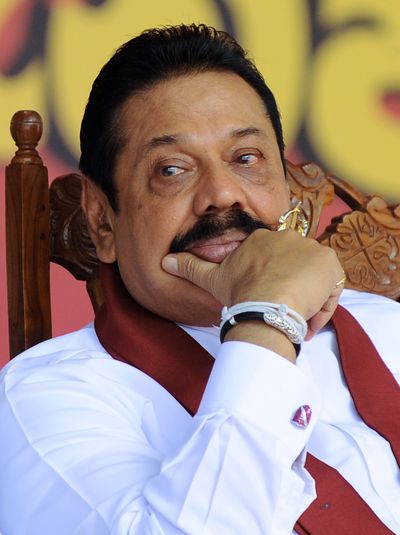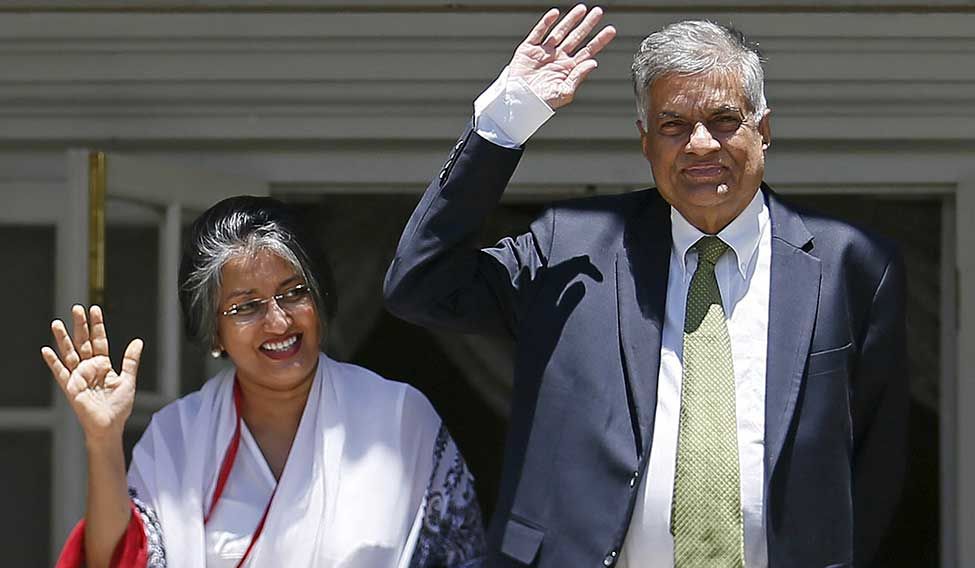Former president Mahinda Rajapaksa was supposed to make a comeback in the general elections. However, it ended with the coalition headed by Prime Minister Ranil Wickremesinghe winning comfortably. Known as the United National Front for Good Governance, the coalition won 106 seats while the United People's Freedom Alliance, led by Rajapaksa, won 95 seats. Wickremesinghe topped the United National Party's Colombo district list with 5,00,566 votes. He received more votes than Rajapaksa, who got 4,23,529 votes from Kurunegala district.
The UNP's victory signifies that the elected government and the prime minister will not be exclusively for one ethnicity but for all Sri Lankans. Hence, the victory signifies the beginning of a national journey towards post-war reconciliation and harmony between religious and ethnic minorities—Tamils, Muslims and Christians—in Sri Lanka.
Ahead of the elections, Rajapaksa focused on wooing the Sinhalese Buddhist majority, with his campaign rooted in re-boosting his image as a war hero. It rekindled fears of separatism, foreign conspiracies and raising the Eelam bogy. Unlike during the presidential election, the Rajapaksa group this time made a strong campaign through social media to attract the youth. They created several Sinhala nationalistic websites, which found hundreds of supporters, to bring back the memories of the civil war, the atrocities committed by the Liberation Tigers of Tamil Eelam and the fear of the LTTE raising its head under the UNP regime. The campaign speeches of Rajapaksa and his party members were on the same lines with a vociferous portrayal of the UNP and its supporters as non-patriotic foreign conspirators.
Wickremesinghe described the UNP's victory as a referendum on Rajapaksa while representatives of the civil society saw it as a referendum against racism. “Sri Lankans have voted in unity to end racism,” said a civil society member.
Also significant was the defeat of the ultra nationalist Bodu Bala Sena, which contested the elections as the Bodu Jana Peramuna. Though it boasted that it would get two million votes if it contested on its own, the BBS, which had the support of the Buddhist clergy, got just 20,000 votes.
Rajapaksa secured a seat in parliament by standing from the northwestern district of Kurunegala after ditching his home constituency, Hambantota, which was won by his son Namal Rajapaksa. Making a comeback as a mere member of parliament would be an embarrassment for Rajapaksa, who had led Sri Lanka for a decade before he was dramatically ousted by his one-time ally Maithripala Sirisena in the January 8 presidential election.
 Flop show: Mahinda Rajapaksa | AFP
Flop show: Mahinda Rajapaksa | AFP
How Rajapaksa, who conceded defeat even before the full election results were released, will present himself politically in the months to come, and whether or not he would plot trouble for the government remains to be seen.
Some social media networks, managed by his supporters, changed the theme to ‘Winning Mahinda in 2020’ and others claimed that Rajapaksa elements would ‘take over’ the government in a year. There was also a fear that he might lose the privileges given to a former president after being elected as member of parliament.
While Sirisena issued a statement requesting calm and non-aggressive celebrations, election commissioner Mahinda Deshapriya said it was one of the most peaceful elections in the history of Sri Lanka. The mood on the streets was calm as celebrations and street processions are banned for a week after the polls under Sri Lankan election laws.
Meanwhile, Wickremesinghe said that the verdict endorsed the revolution ushered in by the presidential election. He called upon the people to maintain peace. He said he hoped to set up a “government based on consensus” and asked the people to work with him “to build a civilised society and a new country to face the challenges of the new age”. For Wickremesinghe and Sirisena, the priority would be to form a 'national government' to push through vital constitutional reforms.
The coalition is a few seats short of the 113 required for a simple majority. However, it is well placed to secure support from the opposition United People's Freedom Alliance as its chairman, Sirisena, is keen on bridging the gap between the alliances.
Analysts say Sirisena could get a few of his party's MPs to support the Wickremesinghe-led coalition government. The Tamil National Alliance, which won 16 seats in the north, and the Marxist Janata Vimukthi Peramuna, which won 6 seats, are also likely to support the government without joining it.
While the TNA contested on the promise of creating an ethnic identity for the Tamils, promoting devolution, and regaining northern land from the military, the JVP promoted non-corruption, ethnic reconciliation and equality for all citizens, and development with a vision. While the TNA's victory was expected, the JVP, which was a prominent third force, suffered an unanticipated setback.







